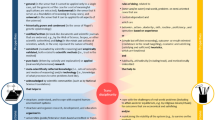Abstract
Purpose of Review
The purposes of this paper are to examine the literature for common threads and attributes inherent to scientific-based communities of practice, and to identify challenges and potential solutions for building a community of scientists to address the water-energy-food nexus.
Recent Findings
The latest research suggests several guiding principles to build and maintain a successful scientific community of practice. These include the following: identifying a shared conceptual vision that is clear in purpose, but also provides for evolution and growth; providing for both internal and external perspectives as well as various levels of participation among members; and facilitating collaboration that satisfies personal and professional motivations.
Summary
There are several challenges in building and maintaining a sustainable water-energy-food nexus community of practice. Perhaps, the most difficult to overcome is the lack of a clear definition, meaning, and identity of the “water-energy-food nexus.” While international collaboration among researchers will provide critical perspective and insight for addressing similar challenges on a more localized basis, the variation in regional jurisdiction and political realities could restrict international collaborative research and implementation of potential solutions.
Similar content being viewed by others
References
Papers of particular interest, published recently, have been highlighted as: • Of importance •• Of major importance
Wenger E. Communities of practice: a brief introduction. 2012. http://hdl.handle.net/1794/11736. Accessed December 2016.
Wenger EC, Snyder WM. Communities of practice: the organizational frontier. Harv Bus Rev. 2000;78(1):139–46.
Kates RW, Clark WC, Corell R, Hall JM, Jaeger CC, Lowe I, et al. Sustainability science. Science. 2001;292(5517):641–2.
Lang DJ, Wiek A, Bergmann M, Stauffacher M, Martens P, Moll P, et al. Transdisciplinary research in sustainability science: practice, principles, and challenges. Sustain Sci. 2012;7(Supp1):25–43. doi:10.1007/s11625-011-0149-x.
Scholtz RW. Environmental literacy in science and society. From knowledge to decisions. Cambridge: Cambridge University Press; 2011.
Kienle A, Wessner M. Principles for cultivating scientific communities of practice. In Communities and Technologies 2005 (pp. 283–299). Springer Netherlands.
Li L, Grimshaw JM, Nielsen C, Judd M, Coyte PC, Graham ID. Use of communities of practice in business and health care sectors: a systematic review. Implement Sci. 2009;4:27. doi:10.1186/1748-5908-4-27. http://www.implementationscience.com/content/4/1/27. Accessed December 2016.
Wenger E, McDermott RA, Snyder W. Cultivating communities of practice: a guide to managing knowledge. Harvard Business Press; 2002.
Wenger E. Communities of practice: learning, meaning, and identity. Cambridge University Press; 1998.
Amin A, Roberts, J. Communities of practice. Varieties of situated learning. Dynamics of Institutions and Markets in Europe research paper. 2006. Oct 27.
•• Mohtar RH, Lawford R. Present and future of the water-energy-food nexus and the role of the community of practice. J Environ Stud Sci. 2016;6:192–9. doi:10.1007/s13412-106-0378-5. This publication is an excellent review of the history of the water-energy-food nexus and a proposed path forward involving an interdisciplinary nexus platform and tools to strengthen sustainable food, water, and energy security.
• Bhaduri A, Ringler C, Dombrowski I, Mohtar R, Scheumann W. Sustainability in the water–energy–food nexus. Water Int. 2015;40(5–6):723–32. doi:10.1080/02508060.2015.1096110. This issue is a review of tools, solutions, and multi-scale governance approaches to water-energy-food nexus sustainability presented at the Sustainability in the Water-Energy-Food Nexus, in Bonn, Germany, in 2014.
• Hayes, E. 2016. Water, energy and food security is more complex than you think. Fair Observer. http://www.fairobserver.com/region/europe/water-energy-food-security-complex-think-23945/. This newsletter article presents an overview of the necessity for and real-world examples of the water-energy-food nexus to meet critical sustainability issues.
•• Kurian M. The water-energy-food nexus: tradeoffs, thresholds and transdisciplinary approaches to sustainable development. Environ Sci Policy. 2017;68:97–106. This publication addresses the challenges of the governance dimension, implementation challenges, evaluation and impact, and tools available to translate scientific research in a water-energy-food nexus approach to support sustainable development.
Scott CA, Pierce SA, Pasqualetti MJ, Jones AL, Montz BE, Hoover JH. Policy and institutional dimensions of the water-energy nexus. Energy Policy. 2011;39(10):6622–30. doi:10.1016/j.enpol.2011.08.013.
• Norris PE, O’Rouke M, Mayer AS, Halvorsen KE. Wicked socio-ecological problems transdisciplinary research approaches. Landsc Urban Plan. 2016;154:115–22. This paper proposes a set of strategies for managing socio-ecological problems that involve transdisciplinary teams.
Jahn T, Bergmann M, Keil F. Transdisciplinarity: between mainstreaming and marginalization. Ecol Econ. 2012;79:1–10.
Steynor A, Padgham J, Jack C, Hewitson B, Lennard C. Co-exploratory climate risk workshops: experiences from urban Africa. Climate Risk Management. 2016;13:95–102.
Vogel C, Scott D, Culwick CE, Sutherland C. Environmental problem-solving in South Africa: harnessing creative imaginaries to address ‘wicked’ challenges and opportunities. S Afr Geogr J. 2016;98(3):515–30. doi:10.1080/03736245.2016.1217256.
Acknowledgments
This research was supported by the Texas A&M WEF Nexus initiative.
Author information
Authors and Affiliations
Corresponding author
Ethics declarations
Conflict of Interest
The authors declare that they have no conflicts of interest.
Human and Animal Rights and Informed Consent
This article does not contain any studies with human or animal subjects performed by any of the authors.
Additional information
This article is part of the Topical Collection on Nexus of Food, Water, Energy
Rights and permissions
About this article
Cite this article
Smith, D.W., Welch, M., Bennett, K.E. et al. Building a WEF Nexus Community of Practice (NCoP). Curr Sustainable Renewable Energy Rep 4, 168–172 (2017). https://doi.org/10.1007/s40518-017-0080-6
Published:
Issue Date:
DOI: https://doi.org/10.1007/s40518-017-0080-6




